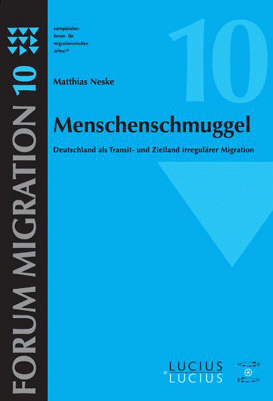Forum Migration 10
Menschenschmuggel
(Human Smuggling)
Deutschland als Transit- und Zielland irregulärer Migration
Human Smuggling has recently become an important issue in the migration policy debate almost worldwide. The origin and diffusion of human smuggling is closely linked today with people's desire to exchange the living conditions in their home country for the opportunity to find better living conditions, social security and political freedom in affluent Western societies. There is human smuggling because borders exist, borders that are only allowed to be crossed under certain legal conditions and, at the same time, the present global demands for migration far exceed the existing legal opportunities. People who, for pecuniary advantage, plan and carry out the unlawful entry and transit of migrants are called human smugglers.
As suggestions how to handle this phenomenon range from common border policies to an augmentation of legal migration channels, surprisingly little is known about the mechanisms of human smuggling, particularly its organisation principles and the human smugglers themselves. This book aims to give both overview and insight into the organisation principles of human smuggling processes.
Table of contents (German)
1. Einführung
- 1.2 Inhaltlicher Aufbau der Forschungsarbeit
- 1.3 Definitionen und Terminologie: Menschenschmuggel,
Menschenhandel
- 1.4 Abgrenzung des Untersuchungsgebietes
2. Rechtliche Bestimmungen zum Menschenschmuggel
- 2.2 Internationales Recht
3. Umfang und Entwicklungstrends des Menschenschmuggels
- 3.1 Statistiken zum Menschenschmuggel
- 3.3 Schleuser und Geschleuste
- 3.4 Unerlaubter Aufenthalt
- 3.5 Dunkelfeldproblematik und Aussagekraft der Statistiken
4. Organisierungsformen im Menschenschmuggel und
ihre begriffliche Bestimmung
- 4.1 Die Organisation als Institution mit formellen Regeln
- 4.2 Der Markt als Ort des Zusammentreffens von Angebot und
Nachfrage
- 4.3 Das Netzwerk als Struktur komplexer sozialer
Verbindungen
- 4.4 Idealtypische Merkmale der drei Organisierungstypen
Markt, Netzwerk und Organisation
5. Methodische Vorgehensweise
Exkurs: Einordnung der Strafverfolgung des Menschenschmuggels in das Gefüge polizeilicher Ermittlungen
- 5.3 Anmerkung zur Vollständigkeit der Ermittlungsakten
6. Merkmale zur Typisierung von Schleusungen
- 6.1 Erklärung der Merkmale und ihr Vorkommen in den
Schleusungsfällen
7. Typen von Schleusungen
- 7.1 Typ I - Partielle Schleusungen
- 7.2 Typ II - Legendierte Visumschleusung
- 7.3 Typ III - Organisierte Etappenschleusungen
- 7.4 Typ IIIa - Sonderform organisierte Etappenschleusungen
aus Krisengebieten
8. Zusammenfassung und Schlussgedanken
- 8.4 Schleusernetzwerke oder Migrationsnetzwerke?
- 8.5 Zukünftige Tendenzen im Menschenschmuggel
- 8.6 Verhinderungsmöglichkeiten
|

Matthias Neske: Menschenschmuggel. Deutschland als Transit- und Zielland irregulärer Migration
Lucius & Lucius, Stuttgart 2007, 369 pages (German).
ISBN 978-3-8282-0397-6, 36,- € |





